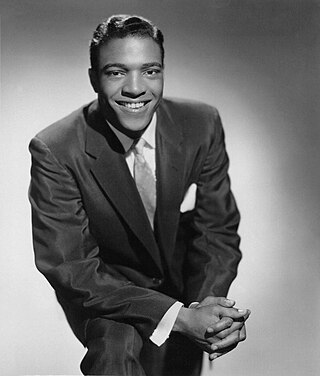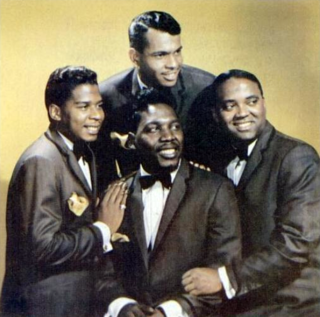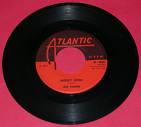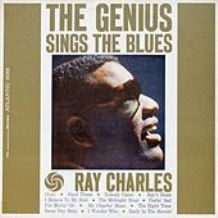
Atlantic Recording Corporation is an American record label founded in October 1947 by Ahmet Ertegun and Herb Abramson. Over the course of its first two decades, starting from the release of its first recordings in January 1948, Atlantic earned a reputation as one of the most important American labels, specializing in jazz, R&B, and soul by Aretha Franklin, Ray Charles, Wilson Pickett, Sam and Dave, Ruth Brown and Otis Redding. Its position was greatly improved by its distribution deal with Stax. In 1967, Atlantic became a wholly owned subsidiary of Warner Bros.-Seven Arts, now the Warner Music Group, and expanded into rock and pop music with releases by Crosby, Stills, Nash & Young, Led Zeppelin, and Yes.

Ruth Alston Brown was an American singer-songwriter and actress, sometimes referred to as the "Queen of R&B". She was noted for bringing a pop music style to R&B music in a series of hit songs for Atlantic Records in the 1950s, such as "So Long", "Teardrops from My Eyes" and "(Mama) He Treats Your Daughter Mean". For these contributions, Atlantic became known as "the house that Ruth built". Brown was a 1993 inductee into the Rock and Roll Hall of Fame.

Ray Charles Robinson was an American singer, songwriter, and pianist. He is regarded as one of the most iconic and influential musicians in history, and was often referred to by contemporaries as "The Genius". Among friends and fellow musicians, he preferred being called "Brother Ray". Charles was blinded during childhood, possibly due to glaucoma.

Clyde Lensley McPhatter was an American rhythm and blues, soul, and rock and roll singer. He was one of the most widely imitated R&B singers of the 1950s and early 1960s and was a key figure in the shaping of doo-wop and R&B.

The Drifters are an American pop and R&B/soul vocal group. They were originally formed as a backing group for Clyde McPhatter, formerly the lead tenor of Billy Ward and his Dominoes in 1953. The second group of Drifters, formed in 1959 and led by Ben E. King, were originally an up-and-coming group named The Five Crowns. After 1965, members swapped in and out of both groups and many of these formed other groups of Drifters as well. Over the succeeding decades, several different bands, all called the Drifters, can trace roots back to these original groups, but contain few—if any—original members.

Bertrand Russell Berns, also known as Bert Russell and (occasionally) Russell Byrd, was an American songwriter and record producer of the 1960s. His songwriting credits include "Twist and Shout", "Piece of My Heart", "Here Comes the Night", "Hang on Sloopy", "Cry to Me" and "Everybody Needs Somebody to Love", and his productions include "Baby, Please Don't Go", "Brown Eyed Girl" and "Under the Boardwalk".

"Shake, Rattle and Roll" is a song written in 1954 by Jesse Stone and first recorded that year by Big Joe Turner, whose version ranked No. 127 on the Rolling Stone magazine list of The 500 Greatest Songs of All Time.

"What'd I Say" is an American rhythm and blues song by Ray Charles, released in 1959. As a single divided into two parts, it was one of the first soul songs. The composition was improvised one evening late in 1958 when Charles, his orchestra, and backup singers had played their entire set list at a show and still had time left; the response from many audiences was so enthusiastic that Charles announced to his producer that he was going to record it.

The Clovers are an American rhythm and blues/doo-wop vocal group who became one of the biggest selling acts of the 1950s. They had a top 30 US hit in 1959 with the Leiber and Stoller song "Love Potion No. 9".

The Sweet Inspirations are an American R&B girl group from Newark, New Jersey, founded by Cissy Houston, mostly known for their work as backup singers on studio recordings for other R&B and rock artists but also a Grammy-nominated recording act in their own right.
The "Mess Around" is a song written by Ahmet Ertegun, co-founder and then-vice-president of Atlantic Records, under the pseudonym of A. Nugetre, or "Nuggy". It was performed by Ray Charles, and was one of Charles's first hits.
The Rhythm and Blues Foundation is an independent American nonprofit organization dedicated to the historical and cultural preservation of rhythm and blues music.

Jesse Albert Stone was an American rhythm and blues musician and songwriter whose influence spanned a wide range of genres. He also used the pseudonyms Charles Calhoun and Chuck Calhoun. His best-known composition as Calhoun was "Shake, Rattle and Roll".
"One Mint Julep" is a R&B song, written and composed by Rudy Toombs, that became a 1952 hit for the Clovers. The song has received over 100 cover versions, both with lyrics and as an instrumental.

"Honey Hush", is a blues song, written by Big Joe Turner, recorded in May 1953 in New Orleans, Louisiana, and released that August by Atlantic Records. It was a number-one song on Billboard's Rhythm and Blues chart for eight weeks.
"Drown in My Own Tears", originally credited as "I'll Drown in My Tears", is a song written by Henry Glover. It is best known in the version released as a single in 1956 by Ray Charles on the Atlantic record label.

The Genius Sings the Blues is an album by Ray Charles, released in October 1961 on Atlantic Records. The album was his last release for Atlantic, compiling twelve blues songs from various sessions during his tenure for the label. The album showcases Charles's stylistic development with a combination of piano blues, jazz, and southern R&B. The photo for the album cover was taken by renowned photographer Lee Friedlander. The Genius Sings the Blues was reissued in 2003 by Rhino Entertainment with liner notes by Billy Taylor.

Ahmet Ertegun was a Turkish-American businessman, songwriter, record executive and philanthropist.

"Comin' Home Baby" is a song originally written as an instrumental by Ben Tucker and first recorded by the Dave Bailey Quintet in 1961, and shortly thereafter by Herbie Mann. Lyrics were added by Bob Dorough, and the vocal version became a US Top 40 hit for American jazz singer Mel Tormé in 1962. The song has since been covered numerous times.
"Drinkin' Wine, Spo-Dee-O-Dee" is a jump blues song written by Stick McGhee and J. Mayo Williams in 1949 and originally recorded by "Sticks” McGhee & His Buddies. It became an early hit for Atlantic Records, reaching #2 on the US R&B charts.














